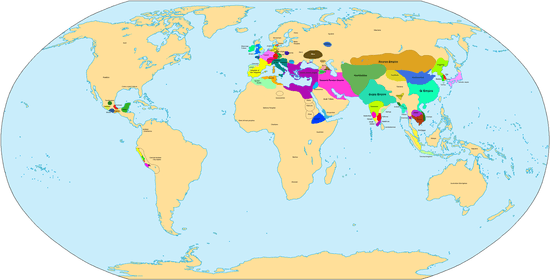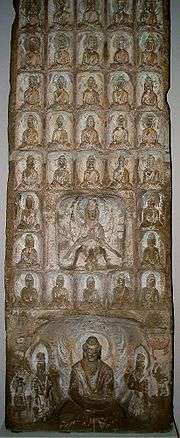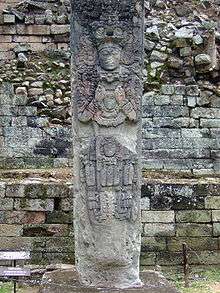6th century
The 6th century is the period from 501 to 600 in line with the Julian calendar. In the West, the century marks the end of Classical Antiquity and the beginning of the Middle Ages. The collapse of the Western Roman Empire late in the previous century left Europe fractured into many small Germanic kingdoms competing fiercely for land and wealth. From the upheaval the Franks rose to prominence and carved out a sizeable domain covering much of modern France and Germany. Meanwhile, the surviving Eastern Roman Empire began to expand under Emperor Justinian, who recaptured North Africa from the Vandals and attempted fully to recover Italy as well, in the hope of reinstating Roman control over the lands once ruled by the Western Roman Empire.
| Millennium: | 1st millennium |
|---|---|
| Centuries: | |
| Timelines: | |
| State leaders: | |
| Decades: | |
| Categories: | Births – Deaths Establishments – Disestablishments |

In its second Golden Age, the Sassanid Empire reached the peak of its power under Khosrau I in the 6th century.[1] The classical Gupta Empire of Northern India, largely overrun by the Huna, ended in the mid-6th century. In Japan, the Kofun period gave way to the Asuka period. After being divided for more than 150 years among the Southern and Northern Dynasties, China was reunited under the Sui Dynasty toward the end of the 6th century. The Three Kingdoms of Korea persisted throughout the century. The Göktürks became a major power in Central Asia after defeating the Rouran.
In the Americas, Teotihuacan began to decline in the 6th century after having reached its zenith between AD 150 and 450. Classic Period of the Maya civilization in Central America.
Events

- Early 6th century – Ah Suytok Tutul Xiu founds Uxmal.

- Early 6th century – Archangel Michael, panel of a diptych probably from the court workshop at Constantinople, is made. It is now kept at The British Museum, London.
- Early 6th century – Page with Rebecca at the Well, from "Book of Genesis", probably made in Syria or Palestine, is made. It is now kept at Österreichische Nationalbibliothek, Vienna.
- By 6th century – Shilpa Shastras is written.
- Early 6th century – first academy of the east the Academy of Gundeshapur founded in Iran by Khosrau I of Persia.
- Early 6th century – Irish colonists and invaders, the Scots, began migrating to Caledonia (later known as Scotland). Migration from south-west Britain to Brittany.
- Early 6th century – Glendalough monastery, Wicklow Ireland founded on St. Kevin. Many similar foundations in Ireland and Wales.
- Early 6th century – Zen Buddhism enters Vietnam from China.
- Early 6th century – Haniwa, from Kyoto, is made during the Kofun period
- Early 6th century – Basilica of Sant'Apollinare in Classe's apse's mosaic is completed.
- 502: Chinese annals mentioned the existence of the Buddhist Kingdom, Kanto Lim in South Sumatra, presumably in the neighborhood of present-day Palembang.
- 507: Battle of Vouillé
- 518: Eastern Roman Emperor Anastasius I dies and is succeeded by Justin I.
- 522: Byzantines obtain silkworm eggs and begin silkworm cultivation
- c. 524: Boethius writes his Consolation of Philosophy.
- 525: Having settled in Rome c. 500, Scythian monk Dionysius Exiguus invents the Anno Domini era calendar based on the estimated birth year of Jesus Christ.
- 527: Justinian I succeeds Justin I as Emperor of the Eastern Roman Empire.
- 529: Saint Benedict of Nursia founds the monastery of Monte Cassino in Italy.
- 532: Nika riots in Constantinople; the cathedral is destroyed. They are put down a week later by Belisarius and Mundus; up to 30,000 people are killed in the Hippodrome.
- 535: Postulated volcanic eruption in the tropics which causes several years of abnormally cold weather, resulting in mass famine in the Northern Hemisphere. (See Extreme weather events of 535–536.)
- 537: Battle of Camlann, final battle of legendary King Arthur.
- 541–542: First pandemic of bubonic plague (Plague of Justinian) hits Constantinople and the rest of Byzantine Empire.
- 543/544: One of Justinian's edict leads to the Three-Chapter Controversy
- 545: Nubian Kingdom of Nobatia converts to Christianity.
- Mid-6th century – Cassiodorus founds a cenobitic monastery and scriptorium at Vivarium in Italy
- Mid-6th century – Buddhist Jataka stories are translated into Persian by order of the Zoroastrian king Khosrau.
- Mid-6th century – Cave-Temple of Shiva at Elephanta Caves, Maharashtra, India, is built. Post-Gupta period.
- Mid-6th century – Eternal Shiva, rock-cut relief in the Cave-Temple of Shiva at Elephanta Caves, is made
- Mid-6th century – Jogeshwari Caves excavated during 6th century A.D. is one of the finest specimen of Brahmanical Rock-Cut Architecture and bears similarity with Elephanta Caves (Cave No. 1) and Dhumar Lena (Cave No. 29) at Ellora Caves.

- Second half of 6th century – Virgin and Child with Saints and Angels, icon, is made. It is now kept at Saint Catherine's Monastery, Egypt.
- 550: Kingdom of Funan dies out.
- 551: Bumin Khagan founded the Turkic Khaganate in the Central Asia
- 552: Buddhism introduced to Japan from Baekje during the Asuka period.
- 553: Second Council of Constantinople
- 554: Eviction of the Ostrogoths from Rome, and the re-unification of all Italy under Byzantine rule.
- 561 to 592: Buddhist monk Jnanagupta translates 39 sutras from Sanskrit to Chinese.
- 563: The monastery on Iona is founded by St. Columba.
- 566: Birth of Lǐ Yuān, founder of the Tang Dynasty and Emperor of China under the name of Gaozu (618-626)
- 568: Lombards invade Italy and establish a federation of dukedoms under a king.
- 569: Nubian kingdom of Alodia converts to Christianity.
- 569: Nubian kingdom of Makuria converts to Christianity.
- 570: Birth of the Islamic prophet, Muhammad.
- 574: The Byzantine empire is invaded by various Slavs, the Balkans are plundered by the Slavs.
- 577: China's Chen Dynasty invents matches.
- 579–590: Reign of Persian Shah Hormizd IV.
- 582–602: Reign of Byzantine Emperor Maurice.
- 585: Suebian Kingdom conquered by Visigoths in Spain.
- 587: Reccared, king of the Visigoths in Spain, converts to Catholicism.
- 588: Shivadeva ascends the throne of the Lichchhavi dynasty in Nepal.
- 589: Third Council of Toledo adds the "filioque" clause to the Nicene Creed in Spain.
- 589: China reunified under the Sui Dynasty (589 – 618).
- 590: Gregory the Great succeeds Pope Pelagius II (who dies of plague) as the 64th pope.
- 594: Beginning of the Bengali Calendar or (বঙ্গাব্দ Bônggabdô or Banggabda).
- 595: Pope Gregory sends Roman monks led by Augustine to England.−
←
Significant people
- Amalasuntha, (c. 495 – 534/535), Queen of the Ostrogoths, daughter of Theoderic the Great
- Arator, Christian poet from Liguria
- King Arthur, legendary British king and victor over the Anglo-Saxons

- Aryabhata, Discoverer of Zero
- Augustine of Canterbury, Roman monk, missionary, and bishop
- B'alam Nehn, (504–544), was the 7th Ajaw of Copan
- Belisarius, Byzantine general
- Benedict of Nursia, (480–547), Umbrian founder of Western Monasticism
- Beowulf, legendary king of the Geats
- Bodhidharma, founder of Chan Buddhism
- Boethius, (c. 480–525), Roman philosopher and theologian
- Bozorgmehr, Persian sage
- Caesarius of Arles, (468/470 – 542), Bishop and Theologian
- Cassiodorus, (c. 485 – c. 585), Roman senator and scholar
- Clovis I, (c. 466–511), first sole King of the Franks
- Columbanus, (540–615), Irish monk and missionary
- Dayi Daoxin, (580–651), fourth Chán Buddhist Patriarch
- Dazu Huike, (487–593), second Chán Buddhist Patriarch
- Ennodius, (473/4 – 521), Bishop of Pavia, poet
- Gregory the Great, (c. 540–604), theologian, sixty-fourth pope (590–604), and civil administrator of Rome
- Gregory of Tours (c. 538–594), Frankish bishop and historian
- Hrodgar, legendary Danish king depicted in Beowulf
- Jianzhi Sengcan, (died 606), third Chán Buddhist Patriarch
- Jizang, (549–623), Buddhist monk and scholar, founder of the Three Treatise School
- Jordanes, Byzantine author of the Getica
- Justinian, (527–565), Byzantine Emperor
- K'ak' Chan Yopaat (578–628) 11th Ajaw of Copan

- Karaikkal Ammeiyar, one of few females among the 63 Nayanmars in early Tamil literature
- Khosrau I of Persia, Sassanid Shah (531–579)
- Leander of Seville, (c. 534–601), Spanish bishop and theologian
- Mohammad, Final Prophet of Islam, (born 570)

- Muhan Khan, Khagan of Göktürk Empire from (554–572) during which Sogdian influence reached its zenith
- Procopius, Byzantine historian
- Radegund (c. 520–587), Thuringian princess and Frankish queen, later nun and founder of Abbey of the Holy Cross, Poitiers
- Shashanka (c. 590–625), unified Bengal and established Bengal's sovereign Gauda Kingdom
- Suiko, Japanese Empress
- Shōtoku Taishi, (573–621), Japanese statesman, member of the Imperial Family, philosopher, and writer of a 17-article constitution
- Sak-Lu (551–553) 9th Ajaw of Copan
- Taliesin, Welsh poet
- Theodora, (c. 500–548), Byzantine empress, wife and counselor to Emperor Justinian I
- Theoderic the Great, (c. 454–526), King of Ostrogoths, King of Italy, regent of Visigoths, patricius of Roman Empire
- Tirunavukkarasar, (late 6th – mid-7th c.) Indian poet
- Tuun K'ab' Hix Ajaw of The Kaan Kingdom (Calakmul) (520–546)
- Tzi-B'alam (553–578) 10th Ajaw of Copan
- Uneh Chan, Maya Ajaw of Kaan kingdom (Calakmul) Ruled AD 579–611.
- Symmachus (fl. 522–526) consul, praefectus urbi', father-in-law of Boethius
- Venantius Clemens Honoratus Fortunatus (c. 540 – 600/609), Venetian poet, traveler, bishop of Poitiers (c. 599 – 600/609)
- Emperor Wen of Sui, founder and first emperor of Chinese Sui Dynasty
- Wil Ohl K'inich (532–551) 8th Ajaw of Copan
- Xiao Yan, founding emperor of the Liang dynasty
- Yax Yopaat was a Maya Ajaw of the Kaan kingdom (Calakmul), ruled AD 572–579
Inventions, discoveries, introductions
- Dionysius Exiguus creates the Anno Domini system, inspired by the birth of Jesus, in 525. This is the system upon which the Gregorian calendar and Common Era systems are based.
- Backgammon (nard) invented in Persia by Burzoe.
- Chess, as chaturanga, entered Persia from India and was modified to shatranj.
- Breast-strap horse harness in use in Frankish kingdom.
- Byzantine Empire acquires silk technology from China.
- Chen Dynasty from China invents matches in 577.
- Silk is a protected palace industry in the Byzantine Empire.
- Vaghbata, Indian medical books.
- In 589 AD, the Chinese scholar-official Yan Zhitui makes the first reference to the use of toilet paper in history.
- Significant to the history of agriculture, the Chinese author Jia Sixia wrote the treatise Qi Min Yao Shu in 535, and although it quotes 160 previous Chinese agronomy books, it is the oldest existent Chinese agriculture treatise. In over one hundred thousand written Chinese characters, the book covered land preparation, seeding, cultivation, orchard management, forestry, animal husbandry, trade, and culinary uses for crops.
References
- Roberts, J: "History of the World.". Penguin, 1994.
| Wikimedia Commons has media related to 6th century. |